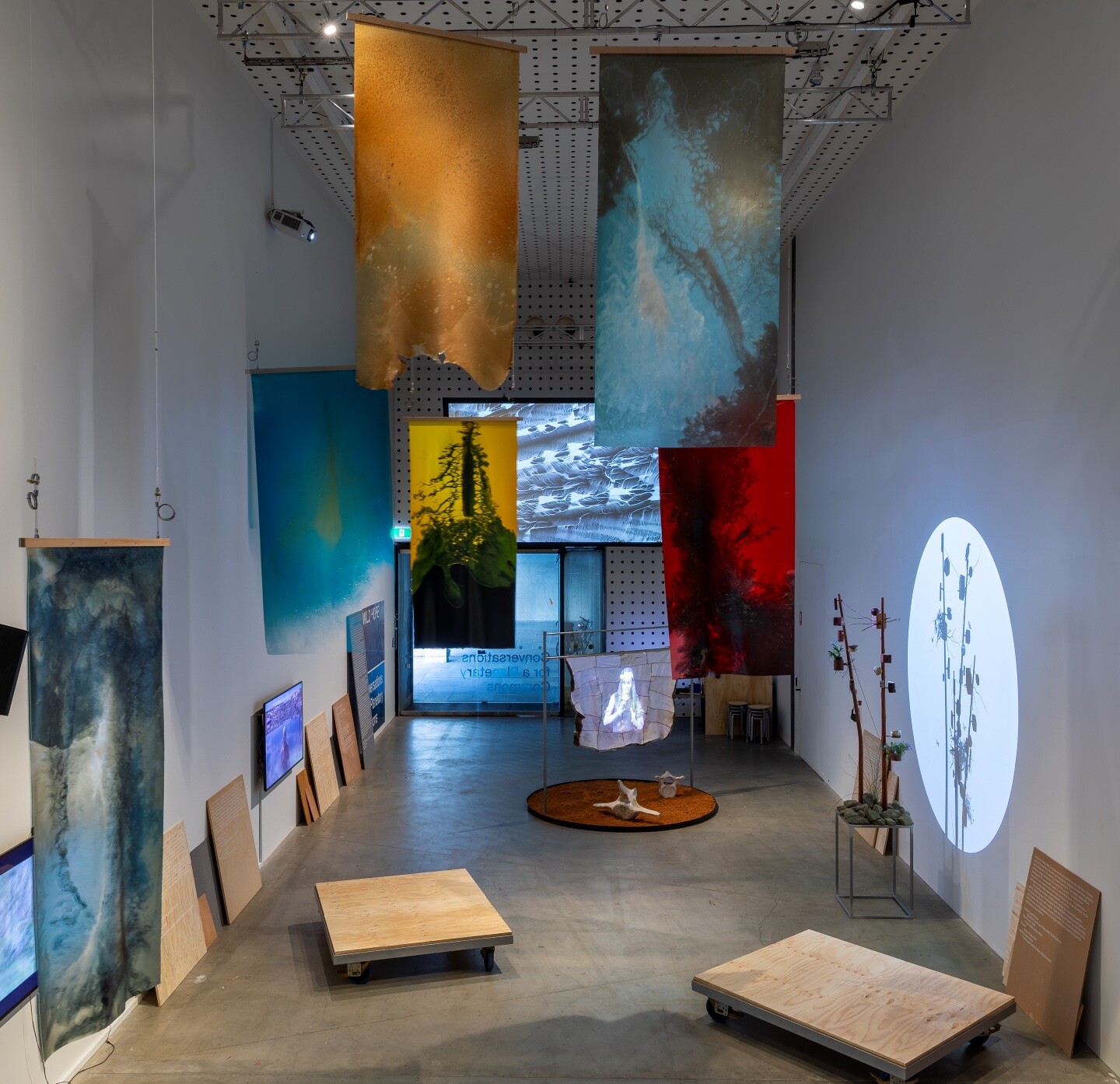Conversations for a Planetary Commons
August 15–September 30, 2023
Design Hub Gallery
Level 2, Building 100, RMIT University, Corner of Swanston and Victoria Streets Carlton, Victoria, Australia 3053
Melbourne Victoria 3000
Australia
Hours: Tuesday–Friday 11am–5pm,
Saturday 12–4pm
T +61 3 9925 2260
galleries@rmit.edu.au
RMIT Design Hub Gallery presents Wild Hope: Conversations for a Planetary Commons, an exhibition that invites you to embrace a radical shift towards “planetary thinking,” a move vital to the survival of human and non-human life on Earth.
The exhibition marks the launch of a partnership between RMIT University and Europe-based not-for-profit Dark Matter Labs, and the beginning of a new joint venture known as the Planetary Civics initiative. Working to tackle interconnected global challenges including climate change, AI and human development, migration and biodiversity loss, the Initiative will bring together international researchers, creative practitioners and industry professionals to explore these issues, united by the goal to shift thinking, dialogue, practice and public policy from the national to the planetary.
We live in an age of disruption, facing interconnected challenges unconstrained by national borders—climate change, biodiversity loss, pandemics and forced migration. In response, we must understand oceans, air, rivers, soil, minerals, forests, glaciers and species biodiversity, among other things, as part of a planetary-scale eco-commons. We must learn from Indigenous leadership, knowledges and practices and work together to compassionately shape our shared future.
Wild Hope envisages a world where urgency and imagination converge, and where art, design and research become catalysts for regenerative change within the context of the climate crisis. The exhibition demonstrates new approaches, innovative alliances and sustainable frameworks for collective thinking and action—showing that creative practitioners can open conversations about and for our endangered ecological commons.
Comprising over twenty exhibits, including newly conceived works, Wild Hope encompasses the disciplines of visual art; architecture; landscape, interior and graphic design; fashion, jewellery and textiles; sound; VR and digital design; and material science. In their responses to the need for change at the level of the microbe, the city and the world, the projects champion the planetary and regenerative thinking we need for a sustainable future.
Wild Hope opens with Meerreeng Karweeyn—Earth Dance, a new work by Vicki Couzens, an RMIT Vice Chancellor’s Indigenous Research Fellow. The installation brings our attention to Aboriginal belonging in Country and the interconnectedness of sky Country, sea Country and earth Country. It shows that listening and learning from Aboriginal ancestral cultural and ecological knowledges is crucial to planetary thinking—and sets the tone for the exhibition.
A series of events and public programs will unfold over the duration of the exhibition, including readings, workshops, meal sharing, panel talks, performances, and conversations with visitors.
Wild Hope pursues a light footprint, resource-sensitive mode of exhibition making. Plastic-based vinyls—typically used in gallery signage—have been replaced with French’s algae-based material to produce texts with zero waste. The labels for the work have been directly printed onto waste materials recycled from previous Design Hub Gallery exhibitions and upcycling depots—in a scenography that is reflective of the design’s sustainable objectives and the hopeful spirit of the exhibition.
Wild Hope: Conversations for a Planetary Commons, which inaugurates the Planetary Civics initiative and the RMIT partnership with Dark Matter Labs, will explore the critical agency of research, creative practice and civic participation in conceiving and protecting our planetary commons.
Practitioners include: Marnie Badham and Tammy Wong Hulbert; Vicki Couzens; Dean Cross; D&K (Chantal Kirby, Ricarda Bigolin) with Žiga Testen; Jessie French; Kate Geck; Marc Gibson; Pirjo Haikola, Tom Park; Kirsten Haydon; Openwork, Sarah Lynn Rees with RMIT ICON Science; Alex Le Guillou; Grace Lillian Lee; Machine Listening (Sean Dockray, James Parker & Joel Stern); Clare McCracken, Rebecca Najdowski and Polly Stanton; Georgia Nowak and Eugene Perepletchikov; Caitlyn Parry & Helen Duong; Maj Plemenitas; RMIT Architecture Immersive Futures Lab and Superscale (Patrick Macasaet, Vei Tan, Shuming Ivy Zhou and Zechen Huang); David Rousell and Amy Cutter-Mackenzie-Knowles; Greg Semu; These Are The Projects We Do Together (Millie Cattlin and Joseph Norster).
Exhibition Curatorium: Naomi Stead, Fleur Watson, Wendy Steele, Katrina Simon
Exhibition graphic design: Stuart Geddes
Part of the City of Melbourne’s Now or Never festival.




